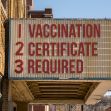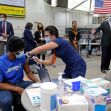Some companies have started listing a completed COVID-19 vaccination as a prerequisite for getting a job with them. Either that or the employee must be willing to get one within 30 days of hire. These requirements are appearing for waitpersons in Manhattan, machine operators in Louisville, and office workers in Houston.
Although companies have been reluctant to require shots because they worried about blowback from employees, and, in the early days, about the availability of vaccines, being vaccinated is more and more often becoming a requirement for employment.
Now that more than half of adult Americans have had at least one shot, and now that the shots are available to all adults in the U.S., some employers are ready to put vaccine requirements in place.
The EEOC has provided information to employers about requiring vaccines.
A recent update noted that “The EEO laws, including the ADA and Rehabilitation Act, continue to apply during the time of the COVID-19 pandemic, but they do not interfere with or prevent employers from following the guidelines and suggestions made by the CDC or state/local public health authorities.”
The ADA’s provisions allow employers to have policies that include “a requirement that an individual shall not pose a direct threat to the health or safety of individuals in the workplace.”
The EEOC recommended four factors be used by employers to determine whether a direct threat exists:
· How long the risk will last
· The severity and nature of any harm
· How likely it is that the possible harm will occur
· How immediate is the danger of potential harm
OSHA has a general requirement that employers maintain “a workplace free from serious recognized hazards.” This obligation strengthens an employer’s right to require inoculations.
With accommodations for medical conditions or religious beliefs that may prevent people from getting the shots, it’s legal for companies to require people to get vaccinated as a condition of employment. They can request proof of vaccination from their employees.
Some people are concerned that we’ll lose precious medical privacy and some equality as a result of mandated vaccination in the workplace. Forrest Briscoe, professor of management and organization at Penn State’s Smeal College of Business, wrote, “Going forward, we must be careful to protect privacy and maintain equitable treatment at work even as we add these necessary new practices intended to protect the workplace and employee health and well-being.”
Although most states currently exempt people only for medical and/or religious reasons, many states are considering legislation meant to prevent employers from mandating vaccines and protect those workers who won’t get the shots.
The proposed legislation varies widely from state to state as far as why and when specific groups of people would be protected from mandatory shots. Nearly every such bill prohibits employers from making vaccination a prerequisite of employment or terminating people based on their vaccination status.
Some bills suggest extending protections outside the workplace and into such places as schools, government agencies, and in some cases, private businesses.
Some of the proposed legislation includes steep fines, civil liability, and in some cases, even criminal liability and imprisonment.
The Houston Methodist Hospital network requires vaccines for current and future employees unless there’s a specific exemption. If workers don’t comply, they’ll be suspended without pay and eventually terminated.
Dr. Marc L. Boom, chief executive of the hospital network, said, “We saw this as a must-do.” There are more than 26,000 people in their organization, including medical personnel who interact with patients and administrative workers whose jobs are outside the hospital. Houston Methodist sees employee vaccinations as critical to keeping patients safe.
Houston Methodist got hate mail from people outside the organization after the mandate was announced. Some people may choose to leave the organization rather than be inoculated. Some employees were vocal about their frustration with the requirement.
Dr. Boom thinks most people will comply. “We’re a scientifically based organization. If somebody decides to leave because of that, honestly, they’re not a cultural fit,” he said.
These mandates are popping up everywhere. Even in Alaska, a job listing posted a requirement that vaccinations would be required to work as a camp guide leading kayakers ad hikers at a telecom company retreat center.
In the San Francisco Bay Area, an HR assistant ad for Boys & Girls Clubs of the Peninsula said in bold letters that anyone who applied “MUST provide proof of COVID vaccination” or contact the HR team if they were eligible for an exemption.
Boys & Girls Clubs of the Peninsula Chief Executive Peter Fortenbaugh says the vaccinations will protect existing employees as well as the children and families they serve. He notes that their client population often comes from groups harder hit by the virus.
Lastique International Corp. is a raw plastics recycler and distributor in Louisville. They have about 50 employees. The company’s owner wanted to require all workers and new hires to have the vaccinations. HR director Kristin Manoucheri Oliviera, HR director, worked to implement the mandate. There were multiple meetings with workers in March and they were given until mid-April to get their first dose.
Though most employees were okay with the mandate, some were not. One worker quit with no notice.
The company’s job listings for machine operators and other positions now include the mandate. If an applicant won’t get a shot, the interview is terminated. Ms. Oliveira says, “It’s no problem at all. It’s just you can’t work at Lastique.”
JBS USA Holdings Inc., a huge meatpacking company, listed as a “job expectation” that new employees have at least one vaccine dose to begin work. The open positions include a corporate communications specialist, a fixed-asset accountant, and an environmental manager.
After the outbreak last year, JBS had 74 cases of COVID-19 at headquarters last October. They also shut down several plants. A spokesman said the company’s campaign for vaccinations across its U.S. facilities and offices has been successful, and now they are requiring new hires to be vaccinated as well because the vaccine is now much more widely available.
Legacy Restaurants in Houston ran a two-day vaccine drive for all staff members and their spouses. This was partly to help fulfill the company’s employee vaccine mandate. New hires are required to have at least one dose before starting work.
Ana Fernandez is Legacy’s health and safety director. She said there was little pushback about the drive, and that most employees were grateful. “We started asking everyone when the vaccine first came out, ‘Hey, how would you feel about getting it?’ And everyone was very willing,” she said.
President Biden has asked all companies of every size to offer employees paid time off to get vaccinated or recover from any side effects. He outlined a tax credit to help small businesses manage the cost of the leave.






